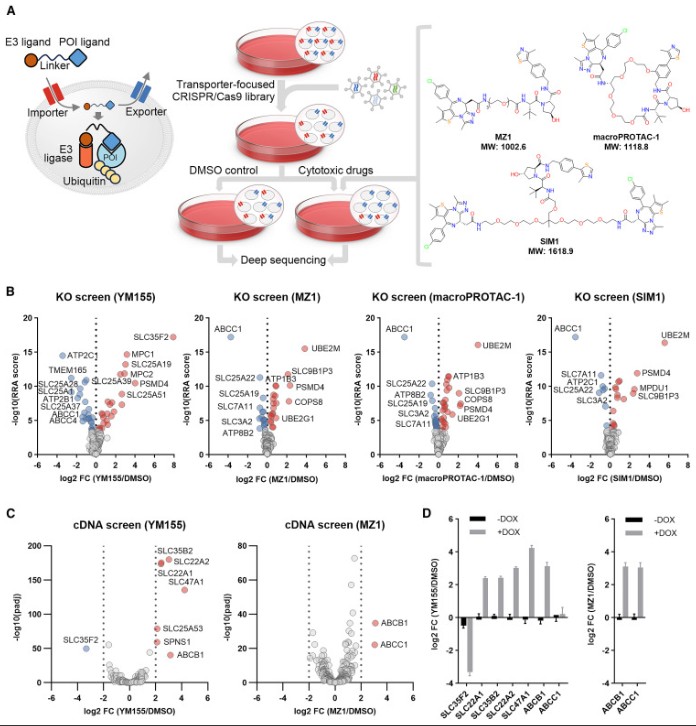Uncategorized Thursday, 2025/03/13
This study used genetic screening to determine that ABCC1 is the main PROTAC resistance factor in cancer cells. It limits therapeutic efficacy by excreting MZ1 hydrolysis products and has different effects on multiple PROTACs in different cancer cell lines. Other related resistance and susceptibility factors were also discovered.
In the field of cancer treatment, protein hydrolysis targeted chimeras (PROTACs) are gradually emerging as a new generation of drugs. This type of drug can accurately target and degrade proteins closely related to cancer growth, bringing hope to overcome "untreatable" targets that traditional drugs find difficult to deal with, and opening up new treatment avenues for many diseases for which there is currently no effective treatment plan. However, the transport mechanism of PROTACs in cells, especially which factors affect their therapeutic efficacy in cancer cells, has always been a mystery that researchers urgently need to solve.
Recently, a study published in Cell Chem Biol, “The efflux pump ABCC1/MRP1 constitutively restricts PROTAC sensitivity in cancer cells”, aimed at identifying cellular factors that affect PROTAC activity. They constructed CRISPR-Cas9 gene knockout libraries and cDNA overexpression libraries targeting transporters, comprehensively screened multiple cancer cell lines, and conducted in-depth analysis using advanced technologies such as metabolomics.
Our Related Products
| Cat.No. # | Product Name | Source (Host) | Species | Tag | Protein Length | Price |
|---|---|---|---|---|---|---|
| ABCB1-30530TH | Recombinant Human ABCB1, His-tagged | E.coli | Human | His | 1036-1280 a.a. |
|
| ABCB1-2548H | Recombinant Human ABCB1, GST-tagged | E.coli | Human | GST |
|
|
| ABCC1-042H | Recombinant Human ABCC1 Protein, GST-Tagged | Wheat Germ | Human | GST |
|
|
| Abcc1-1458M | Recombinant Mouse Abcc1 protein, His & T7-tagged | E.coli | Mouse | His&T7 | Arg1219~Ile1469 |
|
| ABCC1-2325H | Recombinant Human ABCC1 Protein (1248-1531 aa), His-tagged | E.coli | Human | His | 1248-1531 aa |
|
| ABCC1-2402H | Recombinant Human ABCC1 Protein, His (Fc)-Avi-tagged | HEK293 | Human | Avi&Fc&His |
|
|
| ABCC1-3257H | Recombinant Human ABCC1 protein, His-tagged | HEK293 | Human | His | Ser112~Ile195 |
|
| ABCC1-2727H | Recombinant Human ABCC1 protein(871-960 aa), C-His-tagged | E.coli | Human | His | 871-960 aa |
|
| ABCB1-9207H | Recombinant Human ABCB1 protein, His-tagged | E.coli | Human | His | 624-708 aa |
This study has achieved a series of important results. ABCC1 has been clearly identified as the main PROTAC resistance factor in cancer cells. In the screening experiments for MZ1 and related PROTACs, significant deletions were observed in the single guide RNAs (sgRNAs) corresponding to the ABCC1 gene. After overexpression of ABCC1 cDNA, cancer cells showed a significant increase in resistance to MZ1, which strongly demonstrates the crucial role of ABCC1 in the efflux process of PROTAC.

Further research has revealed the specific mechanism by which ABCC1 affects the efficacy of PROTAC. ABCC1 does not directly discharge the complete MZ1, but rather discharges its hydrolysis products. In ABCC1 gene knockout cells, the effective concentration at which MZ1 exerts its function is significantly reduced, and the accumulation of MZ1 and its hydrolysis product MZ1_met in cells is significantly increased. Meanwhile, the excretion rate of MZ1_met significantly slowed down in ABCC1 knockout cells. Based on these experimental results, it can be concluded that ABCC1 reduces the bioavailability of PROTAC by eliminating the hydrolysis products of MZ1, thereby limiting its effect on cancer cells.
The effect of ABCC1 on PROTAC sensitivity varies among different cancer cell lines. In most cancer cell lines, the expression level of ABCC1 is much higher than that of ABCB1. Taking HCT116 cell line as an example, its ABCB1 expression is low, and after ABCC1 gene knockout, the cell's resistance to MZ1 significantly decreases; In the LS180 cell line with similar expression levels of ABCB1 and ABCC1, there is functional redundancy between the two, which together affect the clearance of PROTAC.
In addition, ABCC1 has different effects on PROTACs with different structures. It has resistance to various BET degrading PROTACs, but has no significant clearance effect on some structurally unrelated PROTACs, such as ACBI1, BI-3663, etc. In the genome-wide drug resistance screening, in addition to further confirming known resistance factors such as ABCB1, some genes related to processes such as ubiquitination, mTOR signaling pathway, and cell apoptosis were also discovered, which are also involved in the PROTAC resistance process.
This study successfully revealed that ABCC1, as a key efflux pump, continuously limits the sensitivity of various cancer cells to PROTAC, providing important evidence for understanding the transport mechanism and drug resistance issues of PROTAC in cancer cells. Although the introduction mechanism of PROTAC is not yet clear, this study points out the direction for exploring how to optimize the structure of PROTAC and overcome drug resistance in the future. It is expected to promote the widespread application of PROTAC in clinical treatment and bring new breakthroughs to cancer treatment.
Related Products and Services
PROTAC Targets
Cell and Gene Therapy
Targets of CAR-T Cell Therapy
Cancer Drug Targets
Immune Checkpoint Proteins
Protein Engineering Services
Protein Interaction Service
Protein Expression and Purification Services
Drug Discovery Screening
Protein Pathway Profiling
Reference
Wolf G, Craigon C, Teoh ST, et al. The efflux pump ABCC1/MRP1 constitutively restricts PROTAC sensitivity in cancer cells. Cell Chem Biol. Published online December 24, 2024. doi:10.1016/j.chembiol.2024.11.009
